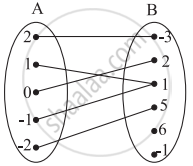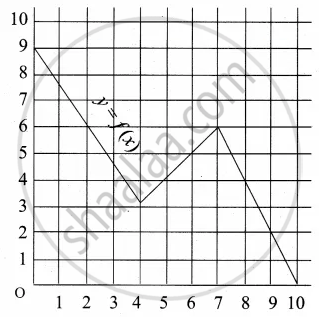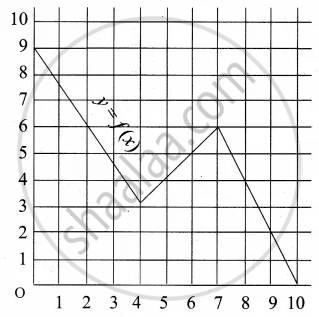Advertisements
Advertisements
Question
Check the injectivity and surjectivity of the following function.
f : N → N given by f(x) = x2
Solution 1
f : N → N given by f(x) = x2
Let f(x1) = f(x2), x1, x2 ∈ N
∴ x12 = x22
∴ x12 – x22 = 0
∴ `(x_1 - x_2) underbrace((x_1 + x_2))_("for" x_1 * x_2 ∈ "N")` = 0
∴ x1 = x2
∴ f is injective.
For every y = x2 ∈ N, there does not exist x ∈ N. Example: 7 ∈ N (codomain) for which there is no x in domain N such that x2 = 7
∴ f is not surjective.
Solution 2
f: Z → Z given by f(x) = x2
Z = {O, ±1, ±2, ±3, ....}
(a) f : Z → Z
Let -1, 1 ∈ Z, f (-1) = f(1)
⇒ 1 = 1
But -1 ≠ 1 ∴f is not one-one i.e., f is not injective.
(b) There are many such elements belongs to co-domain have no pre-image in its domain z.
e.g., 2 ∈ Z (co-domain). But `2^(1//2) != Z` (domain)
∴ Element 2 has no pre-image in its domain Z.
f is not onto i.e., f is not surjective.
APPEARS IN
RELATED QUESTIONS
f, g, h are three function defined from R to R as follow:
(iii) h(x) = x2 + 1
Find the range of function.
et A = (12, 13, 14, 15, 16, 17) and f : A → Z be a function given by
f(x) = highest prime factor of x.
Find range of f.
If f(x) = (a − xn)1/n, a > 0 and n ∈ N, then prove that f(f(x)) = x for all x.
Let f and g be two real functions defined by \[f\left( x \right) = \sqrt{x + 1}\] and \[g\left( x \right) = \sqrt{9 - x^2}\] . Then, describe function:
(iv) \[\frac{f}{g}\]
If f(x) = loge (1 − x) and g(x) = [x], then determine function:
(iv) \[\frac{g}{f}\] Also, find (f + g) (−1), (fg) (0),
If f, g and h are real functions defined by
Let f : [0, ∞) → R and g : R → R be defined by \[f\left( x \right) = \sqrt{x}\] and g(x) = x. Find f + g, f − g, fg and \[\frac{f}{g}\] .
Write the range of the real function f(x) = |x|.
Write the range of the function f(x) = sin [x], where \[\frac{- \pi}{4} \leq x \leq \frac{\pi}{4}\] .
Which of the following are functions?
Let f(x) = x, \[g\left( x \right) = \frac{1}{x}\] and h(x) = f(x) g(x). Then, h(x) = 1
The domain of definition of \[f\left( x \right) = \sqrt{4x - x^2}\] is
Let \[f\left( x \right) = \sqrt{x^2 + 1}\ ] . Then, which of the following is correct?
If f(x) = `{(x^2 + 3"," x ≤ 2),(5x + 7"," x > 2):},` then find f(3)
Check if the following relation is a function.

If f(m) = m2 − 3m + 1, find f(x + 1)
Find x, if g(x) = 0 where g(x) = x3 − 2x2 − 5x + 6
Find x, if f(x) = g(x) where f(x) = x4 + 2x2, g(x) = 11x2
Find the domain and range of the following function.
f(x) = `sqrt((x - 2)(5 - x)`
Find the domain and range of the following function.
f(x) = `sqrt((x - 3)/(7 - x))`
Check the injectivity and surjectivity of the following function.
f : Z → Z given by f(x) = x2
Express the following logarithmic equation in exponential form
ln e = 1
Write the following expression as sum or difference of logarithm
In `(("a"^3 ("a" - 2)^2)/sqrt("b"^2 + 5))`
Prove that alogcb = blogca
Solve for x.
x + log10 (1 + 2x) = x log10 5 + log10 6
Select the correct answer from given alternatives.
Let the function f be defined by f(x) = `(2x + 1)/(1 - 3x)` then f–1 (x) is ______.
Answer the following:
A function f : R → R defined by f(x) = `(3x)/5 + 2`, x ∈ R. Show that f is one-one and onto. Hence find f–1
Answer the following:
Let f : R – {2} → R be defined by f(x) = `(x^2 - 4)/(x - 2)` and g : R → R be defined by g(x) = x + 2. Examine whether f = g or not
A graph representing the function f(x) is given in it is clear that f(9) = 2

Find the following values of the function
(a) f(0)
(b) f(7)
(c) f(2)
(d) f(10)
A graph representing the function f(x) is given in it is clear that f(9) = 2

Describe the following Domain
The data in the adjacent table depicts the length of a person's forehand and their corresponding height. Based on this data, a student finds a relationship between the height (y) and the forehand length (x) as y = ax + b, where a, b are constant.
| Length ‘x’ of forehand (in cm) |
Height 'y' (in inches) |
| 35 | 56 |
| 45 | 65 |
| 50 | 69.5 |
| 55 | 74 |
Check if this relation is a function
The range of the function f(x) = `(x^2 - 3x + 2)/(x^3 - 4x^2 + 5x - 2)` is ______
Find the domain for which the functions f(x) = 2x2 – 1 and g(x) = 1 – 3x are equal.
Find the domain of the function f given by f(x) = `1/sqrt([x]^2 - [x] - 6)`
The domain of the function f defined by f(x) = `1/sqrt(x - |x|)` is ______.
Let f and g be two functions given by f = {(2, 4), (5, 6), (8, – 1), (10, – 3)} g = {(2, 5), (7, 1), (8, 4), (10, 13), (11, – 5)} then. Domain of f + g is ______.
Redefine the function f(x) = x − 2 + 2 + x , – 3 ≤ x ≤ 3
If f(x) = y = `(ax - b)/(cx - a)`, then prove that f(y) = x.
